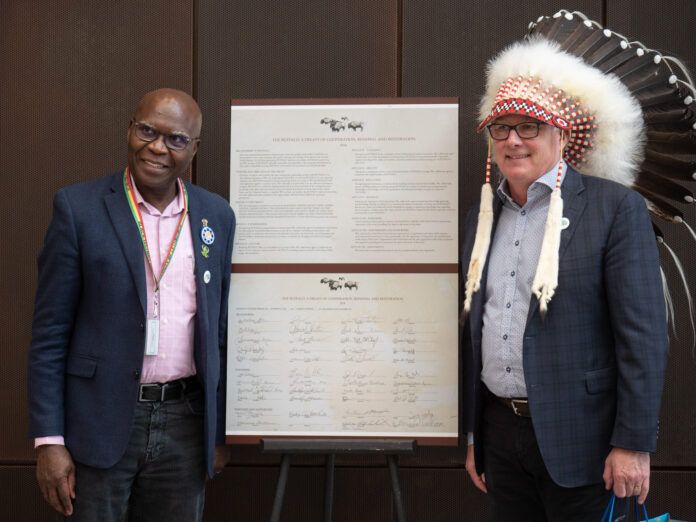The University of Lethbridge is the first post secondary institution in Canada to sign as a supporter of the Buffalo Treaty. The treaty is a document to honour, recognize and revitalize the relationship with buffalo. It was first signed on the Blackfeet Reservation in Montana in 2014. The treaty has signatures from the Blood Tribe and Piikani Nation, as well as many other First Nations across the Canadian prairies and the United States.
“Today is a fantastic, historic day for the signing of the treaty. The University of Lethbridge played a very important role in fact, the drafting of the Buffalo Treaty happened right here at the University of Lethbridge,” said Leroy Littlebear, vice provost for Indigenous Relations at the University of Lethbridge. “The Buffalo Treaty speaks to the relationship of the buffalo. When you read through the Buffalo Treaty itself, it speaks about conservation, it speaks to culture, it speaks to education, economics, health and research — which are all areas that an institution of higher education does work on and so on in terms of passing that knowledge on to students.”
University president Mike Mahon and Provost and vice president Erasmus Okine signed the treaty at an event in the Science Commons Atrium at the university on March 8.
“For us to be here today to sign onto the Buffalo Treaty as a university that is named after a sacred buffalo stone is of course very very important but also exciting for us because it continues to build upon the efforts and traditions this university has undertaken for many many year, well before my time as president,” Mahon said.
During the event, Lethbridge Mayor Blaine Hyggen, along with members of city council, also signed the treaty.
“It’s quite important, the historical significance, but also the modern context of what the buffalo means to individuals, to communities, to groups, to our plains people and to our Blackfoot communities,” said Charlene Bruised Head-Mountain Horse, Indigenous relations advisor for the city.




